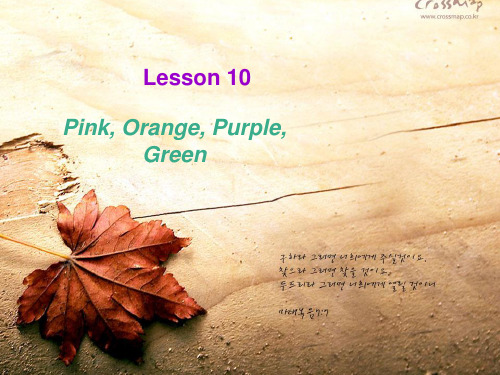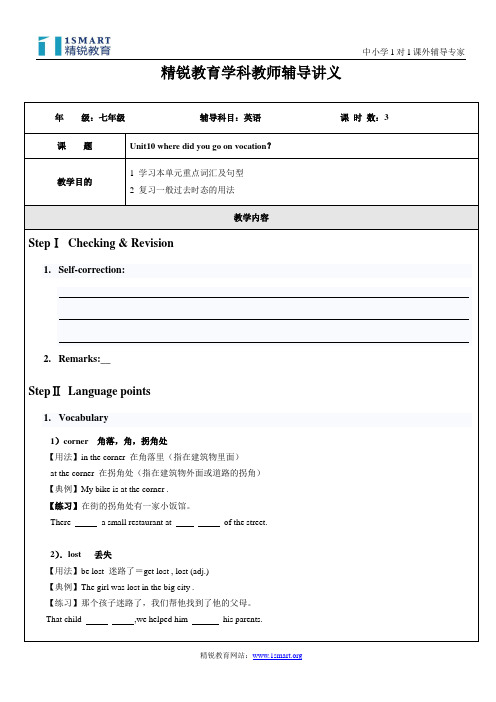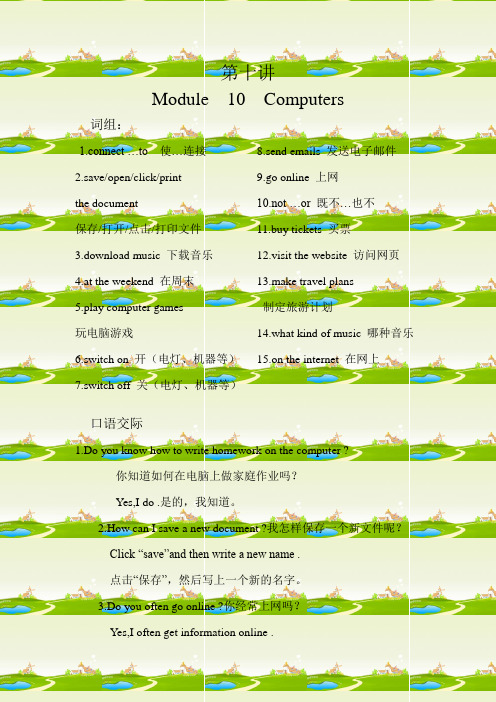初一英语讲义 第十讲
冀教版七年级英语上册第十课PPT课件

2.What are they?
five green erasers
8
-What are they? -They are _____________.
two yellow markers three blue chairs
four purple pencils five green erasers
3
1.What colour is it?
ppple
green
4
2.What are they?
two yellow markers
5
2.What are they?
three blue chairs
6
2.What are they?
four purple pencils
9
3.How many colours do you like?
How many colours do you like?
Three.
What are they?
They are red, blue, yellow, green and…
Danny! That’s not
three!
Oh! 10
Listen and answer
13
1. Talk about the colours with your partner around us.
2. Draw a picture of Danny and colour it as you like.
14
Lesson 10 Pink, Orange, Purple,
Green
1
pink orange purple green are they chair eraser
七年级下unit10 讲义

精锐教育学科教师辅导讲义年级:七年级辅导科目:英语课时数:3课题Unit10 where did you go on vocation?教学目的1 学习本单元重点词汇及句型2 复习一般过去时态的用法教学内容StepⅠChecking & Revision1.Self-correction:_______________________________________________________________________________2.Remarks:___________________________________________________________________________________ StepⅡLanguage points1.Vocabulary1)corner角落,角,拐角处【用法】in the corner 在角落里(指在建筑物里面)at the corner 在拐角处(指在建筑物外面或道路的拐角)【典例】My bike is at the corner .【练习】在街的拐角处有一家小饭馆。
There a small restaurant at of the street.2).lost 丢失【用法】be lost 迷路了=get lost , lost (adj.)【典例】The girl was lost in the big city .【练习】那个孩子迷路了,我们帮他找到了他的父母。
That child ,we helped him his parents.3).help v. 帮助【用法】help sb. (to) do sth.=help sb for sth 帮助某人干某事【典例】He always helps us learn English4). make v. 使...【用法】make sb. do sth. 让/使某人干某事let / have sb. do sth. do前不带to【典例】The movie makes me relaxing .Let the boy do his homework alone .5).feel v. 感觉【用法】feel+ adj. 感到...【典例】I feel hungry / tired /happy / excited【练习】I feel (relax) (用所给词的适当形式填空)6). decide v. 决定【用法】decide to do sth. 决定干某事【典例】They decided to go to Hainan on vacation .【练习】.Today the weather is very cool,so we (决定) to play tennis.7)fun n. 乐趣【用法】have fun doing something干某事有乐趣=enjoy oneself doing something【典例】We have fun learning and speaking English .【练习】We enjoy ourselves learning and (speak) English .我们学英语有很多乐趣.8)find v. 发现【用法】find sb. doing sth. 发现某人在干某事find sb. do sth. 发现某人干过某事【典例】I find him reading the novel (小说).I found him go into the room .2.Phrase3.Structure1)Where did you go on vacation? I went to summer camp.Where did they go on vacation? They went to New Y ork City.Where did he go on vacation? He stayed at home.Where did she go on vacation? She visited her uncle. 一般过去时的用法2)Did you/he/she/they go to Central Park?Yes, I/he/she/they did.No, I/he/sh e/they didn’t.3)How were the movies? They were fantastic.4.Grammar一般过去时的用法(1)一般过去时表示在过去某个特定时间发生,也可以表示过去习惯性、经常性的动作。
冀教版七年级上册英语优质课件Lesson 10

Role-play
1. Role play the conversation in groups; 2. Role play the conversation in front of the class.
Colourful clothes
Skirt, sweater, dress and hat. These, those, this and that! Pants, shoes, shirts and socks. Take them all out of the box! Red, yellow, blue and white. Colourful clothes are so bright!
Clothes for a sunny day
hat
T-shirt
shorts
skirt
Clothes for a rainy day
raincoat
boots
jacket
Clothes for a snowy day
gloves
scarf
sweater
You may catch a cold.
shirt. look用作系动词,意为“看上去;看起 来”,后接形容词。
Your mum looks young. 你妈妈看上去很年轻。 【拓展】look还可以用作实义动词, 意为“看”,固定短语:look at看。 Look at me.看我。
7.Danny goes back and puts on a jacket. ◆go back用作动词短语,意为“回去”。
write it down? 3. Don’t go outside without a jacket. You may
《初中英语七年级下册第10课》课件

上有三碗羊肉汤。(谓语动词are与three bowls保持一致)
更多讲解详见英语RJ七下《教材帮》 Unit10 语法帮·专题课
Translate the sentences and pay attention to the red words. a. They keep a chicken in the back yard.
car1rots
bowl
mmuttonn
spe2cial
woul1d like takoer1doenre’s
po4tato cabbage
what kind wha2t size
What kind of noodles would you like?
What size would you like?
初中英语七年级下册第10 课
Warming up
扫雷游戏 单词下埋着6颗M雷in,e 学sw生ee选pi择ng单词并读出,如 果单词下没有雷则可得分,如果有,则不得分。
noo2dle beef wo2uld y1et large
order one b1owl of chicken
si3ze
tom3ato
Summaቤተ መጻሕፍቲ ባይዱy
I’d like a large bowl, please.
Yes, please.
Is there any meat in the tomato and egg soup?
No, there isn’t any./ No, there’s no meat.
七年级英语 Lesson 10

七年级英语 Lesson 10难度:中等1. 词汇掌握本课中涉及了一些重要的词汇,学生们需要对这些词汇有所了解和掌握。
下面是这些词汇的列表:•educate:教育•poverty:贫困•characteristic:特征,特点•charity:慈善机构•environment:环境•volunteer:志愿者•various:各种各样的•opportunity:机会•disadvantage:不利条件,劣势•responsible:负责任的2. 课文阅读本课的主要内容是一篇阅读文章,文章讲述了一个关于慈善机构的故事。
学生们需要仔细阅读并理解文章的内容。
文章摘录:Do you know what a charity is? A charity is an organization that helps people who are in need. It raises money through donations and uses the money to provide various forms of assistance to those less fortunate.One example of a charity is Educate for Change, which aims to improve education opportunities for children living in poverty. Their volunteers work in different schools, teaching children and helping them with their studies.In addition to education, charity organizations also focus on other areas such as the environment. They organize tree planting events and promote recycling to protect our planet.Volunteering is a great way to contribute to these charitable organizations. It not only helps those in need but also allows you to develop valuable skills and gain a sense of fulfillment.Let’s all do our part to make the world a better place!阅读理解题:1.What is a charity?2.What is the goal of Educate for Change?3.Besides education, what other areas do charity organizations focus on?4.What are the benefits of volunteering?3. 语法重点本课中涉及了一些重要的语法点,学生们需要对这些语法进行理解和掌握。
七下 Unit 10 讲义

教师叶荣兴学生姓名上课时间学科英语年级初一课时计划第()次课UNIT 10 I'd like some noodles.一.词法1.单词记忆单词意思记忆法1 noodle n.面条炉得儿:要吃面条,得放炉火上面煮一下才能吃得2 mutton n.羊肉马疼:羊被杀了,成了羊肉,马心疼3 beef n.牛肉壁虎:吃了一块牛肉干,很像一只壁虎4 cabbage n.卷心菜;洋白菜cab-的士-age年纪:的士车上了年纪就卷成团,成了卷心菜5 potato n.土豆;马铃薯坡推土:土豆种在坡上,推开土就看到了6 special n.特色菜;特价品;私奔秀:要把私奔秀出来,一定是很有特色的私奔秀特别的;特殊的7 would modal v.愿意悟得:悟得到了,就会表示愿意8 yet adv.(常用于否定句或夜特:夜里还特别努力,仍然是令人刮目相看的疑问句)还;仍然9 large adj.大号的;大的拉极:东西被拉到极限,就会特别大了10 order n.&v.点菜;命令我的:我的东西,快点给我!这是命令!11 size n.大小;尺码筛子:尺码就像是筛子一样,筛出符合的东西12 bowl n.碗宝儿:饭碗对于每个人来说都是宝儿,打破了就没得吃了13 tofu n.豆腐音译词14 meat n.(可食用的)肉米特:肉是可以代替米的特别的东西15 dumpling n.饺子打扑灵:16 porridge n.粥;面糊破锐鸡:锐气被破掉了的鸡,就只能喝粥才能活下来了17 onion n.洋葱啊您:啊,您是谁啊?我被洋葱迷了眼,看不见了18 fish n.鱼;鱼肉肥溪:肥肥的溪水里面会有很多鱼19 pancake n.烙饼;薄饼pan-煎锅cake蛋糕、饼:煎锅煎出来的饼子20 world n.世界窝儿得:我的窝儿里面得到的东西就是我的世界了21 answer n.答案v.回答按说儿:按情况来说说话儿22 different adj.不同的dif-=dis-离开fer-=take拿-ent形容词后缀:往不同方向拿23 cake n.蛋糕K客:K客来了,一定要吃蛋糕24 candle n.蜡烛看得儿:有了蜡烛就可以看得到了25 age n.年龄埃及:埃及是一个五千年的古国,有很大年纪了26 blow v.吹不漏:漏不漏,吹一吹,看看漏不漏风,就知道了27 if conj.如果衣服:如果穿上不同的衣服,就会有不同的效果28 will v. 将要;会未而:未发生而将要发生的事情,会怎么样呢?29 candy n.糖果看地:看,地上掉了很多糖果!30 lucky adj.幸运的luck运气-y形容词后缀:31 popular adj.受欢迎的;普遍的popul-=people人-ar形容词后缀:人多的,就会受欢迎32 idea n.想法;主意爱第二:为什么爱第二呢?你有什么想法?2. 语法:(1)不可数名词不可以加“a/an”,需要加“a cup of/a piece of等” 表示数量。
初一英语上册第十讲 教材

十讲Module 10 Computers 词组:1.connect …to 使…连接2.save/open/click/printthe document保存/打开/点击/打印文件3.download music 下载音乐4.at the weekend 在周末5.play computer games玩电脑游戏6.switch on 开(电灯、机器等)7.switch off 关(电灯、机器等)8.send emails 发送电子邮件9.go online 上网10.not …or 既不…也不11.buy tickets 买票12.visit the website 访问网页13.make travel plans制定旅游计划14.what kind of music 哪种音乐15.on the internet 在网上口语交际1.Do you know how to write homework on the computer ?你知道如何在电脑上做家庭作业吗?Yes,I do .是的,我知道。
2.How can I save a new document ?我怎样保存一个新文件呢?Click “save”and then write a new name .点击“保存”,然后写上一个新的名字。
3.Do you often go online ?你经常上网吗?Yes,I often get information online .是的,我经常上网找信息。
4.How do you like the computer ?你觉得电脑怎么样?I like it very much.I t helps me a lot .我非常喜欢它,它帮了我很多。
5.How often do you use a computer ?你多长时间用一次电脑?I useit every day .我每天使用它。
6.What do you usually do on your computer ?你经常用电脑做什么?I usually play games and send emails.我通常玩游戏和发送邮件。
Unit10课时2SectionB(教师版)七年级英语下册讲义(人教版)

Unit 10 I’d like some noodles.SectionB知识精讲Point 1 fish鱼;鱼肉(1)fish作可数名词时,意为“鱼”,表示数量时单复数同形;表示种类时其复数要加心。
I have three fish at home.我家里有三条鱼。
There are different kinds of fishes in the sea.大海里有各种各样的鱼。
(2)fish作不可数名词时,意为“鱼肉”。
I like eating fish.我喜欢吃鱼肉。
(3)fish作动词时,意为“钓鱼”。
My father loves to fish.我父亲喜欢钓鱼。
Point 2 I don’t like onions, green tea or porridge. 我不喜欢洋葱、绿茶和粥。
or此处作并列连词,意为“或者,和”,常用于否定句中,肯定句中用and。
I don’t like chicken or beef.我不喜欢鸡肉和牛肉。
I like onions, green tea and porridge.我喜欢洋葱、绿茶和粥。
【拓展】①or用在选择疑问句中,意为“或;还是”。
—Is your younger brother tall or short?你弟弟个子高还是矮?—He is tall.他个子高。
②or用于否定词后,意为“也不”。
He never smokes or drinks.他从不抽烟,也不喝酒。
③or用于“祈使句+or+简单句”句型中,意为“否则”。
Hurry up, or you’ll be late for class.快点儿,否则你将上课迟到。
Point 3 Birthday Food Around the World 世界各地的生日食品around the world意为“世界各地”,相当于all over the world,此处为介词短语,作后置定语。
- 1、下载文档前请自行甄别文档内容的完整性,平台不提供额外的编辑、内容补充、找答案等附加服务。
- 2、"仅部分预览"的文档,不可在线预览部分如存在完整性等问题,可反馈申请退款(可完整预览的文档不适用该条件!)。
- 3、如文档侵犯您的权益,请联系客服反馈,我们会尽快为您处理(人工客服工作时间:9:00-18:30)。
Unit 11 what time do you go to school ?一. [话题](Topic):谈论时间二.[重点词组](Key Phrases)1. do morning exercise 做早操2. have lessons 上课3. play football 踢足球4. do some cleaning 做清洁5. play the piano 弹钢琴6. watch TV 看电视7. listen to the radio 听收音机8. read newspapers 看报纸9. log in line 上网/ surf in line, surf the internet.10. cook supper 做晚饭11. write my diary 写日记12. do some washing 洗东西13. play chess 下棋14. play computer games 玩电子游戏三.[交际用语]1. What time do you get up? I get up at six o’clock.2. What time does he /she eat breakfast?3. He/She eats breakfast at seven o’clock.4. When do people usually eat diner?5. People usually eat dinner in the evening.6. When does Rick usually get up? He usually gets up at…四. [重点难点释义](Language Points)1.get up 是一个固定词组,意为“起床” .相似的说法还有“be up”.如: He gets up very early. = He is up very early.另外,get 与不同的词组搭配,还有很多固定词组.如:get back 归还,取回.get home 到家get …for 为某人拿/买…get …from 从某人那得到2. go to school “上学”是一个固定词组,go 也有很多的固定搭配。
如:go to a moviego homego shopping3.run 是一个动词, 意为“跑” .run 的第三人称单数和现在分词是:runs, running. 固定搭配, run after.4. eat breakfast 吃早饭eat breakfast =have breakfast5. take a shower “洗澡” ,这是一个固定词组, 其中take 可以由have 代替.take a shower= have a shower 类似的短语还有take/ have a resttake/have a walk6.in the morning.在英语中表示早、中、晚的短语很多。
如:in the morning/ afternoon/ evening在早晨/下午/傍晚at noon 在中午at night 在晚上at midnight 在子夜this morning/afternoon/evening今天早晨/下午/晚上7.start 意为“开始”, 同义词是begin。
可以构成下列短语:start /begin to do sth.start/begin doing sth.start out8. write a letter to sb.给某人写信answer the letter写回信五.语法知识关于时间(time)a. 时间的表达法:(1)直读式,即直接读出时间数字eg. 7:05 seven five 8:16 eight sixteen9:30 nine thirty 10:47 ten forty-seven.(2)过、差式,即几点差几分,几点过几分。
(以30分为分界线)eg. 1:25 twenty-five past one 2:30 half past two3:43 seventeen to four 4:38 twenty-two to five(3)12小时制6:00 a.m. 上午6点8:20 p.m. 下午8点20分(4)24小时制13:00 13点钟22:15 22点15分(5)15分可用quartereg. 4:15 a quarter past four 5:45 a quarter to sixb. 时间前通常用at. at 5 o’clock at 7:30 p.m.c. 关于时间的问法(1)以“when”提问,“什么时候”?可以是较长的时间段,也可以是较短的时间点eg. When is your birthday? My birthday is Dec. 29th.你的生日是什么时候?我的生日是12月29日。
这里就是指一天的时间段When do you go home? I go home at 4:30 p.m.你几点回家?我下午4:30回家。
这里when问的是具体的时间。
(2)具体几点我们通常用what time提问What time is it now? or Wha t’s the time?几点了?It’s 9:26.现在几点了?现在九点二十六。
What time is it by your watch? It’s 8:36. Oh, It’s 50 minutes late.你手表几点了?8:36,哦,它慢了50分钟。
What time do you get up? I get up at 6:00 a.m.你几点起床?我早上6点起床。
目标检测一、语音知识:( )1. A. hour B. your C. four D. for( )2. A. date B. face C. have D. take( )3. A. car B. party C. park D. quarter( )4. A. but B. bus C. music D. mum( )5. A. orange B. age C. egg D. page二、积累与运用:(1)短语翻译:6. 看电视__________________________________7. 打鼓___________________________8. 上班____________________________________9. 吃晚饭_________________________10.一张卡片________________________________11.go to school_____________________12.take a shower_____________________________13.at eleven thirty___________________14.early morning news________________________15.know about_____________________(2)在B栏中选择A栏的答句:A B( )16. Can you see it? A. We want to go this afternoon. ( )17. How can I contact you? B. My phone number is 421-5129 ( )18. When do you want to go? C. It’s $15.( )19. How much is the Shirt? D. Yes, I can.( )20. Does she like movies? E. No, she doesn’t.三、选择填空题:( )21. Here are your new clothes, please __________________.A. put on themB. put it onC. put them on( )22. Thanks for _________________ me.A. helpingB. to helpC. help( )23. I am busy __________________ English in my room.A. to readB. readingC. read( )24. I want to know something _________________ your evening.A. aboutB. onC. around( )25. He ____________________ at 6:00 in the afternoon.A. get homeB. gets to homeC. gets home( )26. __________________ a good time to listen to him sing!A. HowB. WhatC. Why( )27. ________________ at 7:30 in the morning.A. The classes beginsB. Class beginC. Class begins( )28. He __________________ his homework ____________ Sundays.A. doesn’t, onB. don’t do, inC. doesn’t do, on( )29. It’s time ________________ school.A. go toB. forC. to go( )30. You must __________________ a schedule.A. makeB. writeC. read( )31. He is always the last one ___________________ to school.A. toB. to getC. get( )32. A: Please ________________ the word.B: S-C-H-O-O-L, school.A. writeB. sayC. spell( )33. We usually eat _______________ lunch at 12:30.A. myB. theC. X( )34. Mike often ________________ a shower in the morning.A. makesB. haveC. takes( )35. Do you often watch news _______________ TV?A. byB. onC. in四、完形填空:Mike likes music very much. 36 he was young, he wanted 37 be a famous musician. But now he is a 38 . He works in a hospital. He 39 plays light music when he is working. He finds 40 patients are happy if they 41 the beautiful music. So he puts a CD player 42 the waiting room and plays the 43 to his patients every 44 .All his patients 45 Mike is a good doctor.( )36. A. What B. When C. Where( )37. A. to B. / C. for( )38. A. actor B. musician C. doctor( )39. A. often B. never C. doesn’t( )40. A. a lot B. lot C. lots of( )41. A. hear B. listen C. listen to( )42. A. under B. in C. on( )43. A. music B. movie C. opera( )44. A. date B. today C. day( )45. A. think B. like C. want五、阅读理解:AMike works very long hours every day. He usually gets up at 17:00. He has a shower and makes his breakfast. What a funny time to make breakfast! After breakfast he practices his guitar, then he puts on his jacket and goes to work. To get to work, he takes the number17 bus to the Star Hotel. The bus usually leaves at 19:15. He works all night. People love to listen to him! He gets home at 7:00, and he watches the early morning news on TV. He goes to bed at 8:30, a tired but happy man. Can you think what his job is?( )46. How long does Mike work?A. 7 hoursB. 8 hoursC. about 9 hoursD. all night( )47. He ____________ and makes his breakfast.A. gets upB. takes a showerC. worksD. washes his face( )48. What does Mike do after breakfast?A. He goes to work.B. He puts on his clothes.C. He practices his guitar, then puts on his jacket and goes to work.D. He practices his guitar.( )49. Maybe he is ________________________.A. a workerB. a singerC. a writerD. a teacher( )50. How does he go to work?A. By carB. By bikesC. On footD. By busBIn many English homes people eat four meals a day. They have breakfast at any time from seven to nine in the morning. They eat porridge(粥) eggs or bread and drink tea or coffee at breakfast. Lunch comes at one o’clock. Afternoon tea is from four to five in the af ternoon and dinner is about half past seven. First they have soup, then they have meat or fish with vegetables. After they eat some other things, like bananas, apples or oranges. But not all English people eat like that. Some of them have their dinner in the middle of the day. Their meals are breakfast, dinner, tea and supper and all these meals are very simple.( )51. Many English people have _________________ meals a day.A. twoB. threeC. fourD. five( )52. People may have _______________ for their breakfast according to the passage.A. tea and eggsB. hamburgers and teaC. coffee and saladD. eggs and fish( )53. People have lunch at ______________.A. any timeB. nineC. fiveD. one( )54. People don’t have _____________________ for their dinner.A. bananas and applesB. soup and meatC. meat and fishD. porridge( )55. Most Englishmen have dinner ________________.A. at oneB. at any timeC. at noonD. in the evening六、单词拼写:56. She _________________________________(通常) gets up at 6:30 a.m.57. I often take a ________________________________(淋浴) before I go to bed.58. He _______________________________________(工作) in a big factory.59. What time do you often do your __________________________(作业)?60. How many ___________________________________(字母) are there in English?61. What are your best __________________________________(祝愿)?62. Their ___________________________(工作) are standing and watching at the door.63. My friends are coming ___________________________________(不久).64. He ______________________________(听) to the teachers carefully in class.65. My friend ______________________________(写信) to me three times a month.七、句型转换根据要求改写下面句子:(10分)66. He gets home at five in the afternoon. (就划线部分提问)____________ ____________ _____________ he _____________ home in the afternoon?67. I think Tom is at home. (否定句)I ______________ think Tom ____________ at home.68. Now it’s five thirty. (同义句)Now it’s _____________ _____________ _______________.69. She goes to work by car.(就划线部分提问)_____________ ______________ she _____________ to work?70. Jack’s family has one shower. (就划线部分提问)_____________ ____________ _____________ does Jack’s family ______________?八、补全对话:A: Tom, 71B: Well, 72 . So I get up at a quarter to seven. I never(从不) go to school late. A: Do you have breakfast at home?B: Yes, 73.A: And when do you go to school?B: Class begins at 8:00, so I go to school at 7:45, 74A: 75B: I leave school at 5:05 and I get home at 5:15.九、书面表达:根据表格提示,以My day为题,写出自己一天的活动安排。
